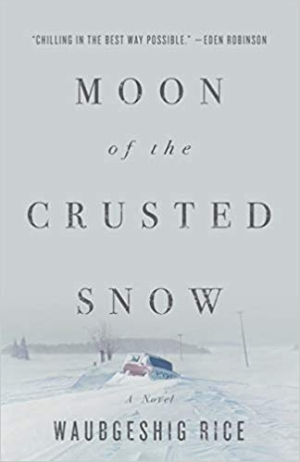Moon of the Crusted Snow
Moon of the Crusted Snow is an isolated dystopia—a picture of what the end of the world might look like if you only ever lived at the edge of the world to begin with.
When the power goes out in a northern Anishinaabe community, its tribal leaders aren’t initially worried. Most of the connected conveniences are newer to them, anyway. But then the power stays off. A food delivery from the south does not turn up. And whether they let those around them see it or not, Evan and the other community leaders begin to plan for the worst.
Then an outsider, Justin Scott, arrives, towing an arsenal and a personal supply of booze. He announces chaos in the south and begs to stay, but chaos trails him anyway. His influence poisons community relations, and Evan—with his partner, Nicole, and their two young children—faces the possibility that the Anishinaabe won’t make it through the winter intact. Young girls turn up dead in the snow; suicides follow. And Scott has something dark and inarticulable planned, not to mention aspirations to an unearned leadership role.
The text is somber and controlled as it builds toward its ultimate revelation. Evan progresses, at home and in his community, with outward calm, but it’s all a wary calculation. When the outside world fades away here, it’s no more violent than other past challenges to the community: there’s hunger, there’s desperation, and there’s death, but its all familiar. The Anishinaabe will persist.
Hints of an anti-colonialist allegory emerge with Scott’s appearance, but they aren’t the priority: survival is, as well as maintaining community traditions and knowledge that has faced, and survived, existential threats before. Moon of the Crusted Snow is an uncommon dystopia, both wistful and tough, in which there’s nothing all that new about the end of everything.
Reviewed by
Michelle Anne Schingler
Disclosure: This article is not an endorsement, but a review. The publisher of this book provided free copies of the book to have their book reviewed by a professional reviewer. No fee was paid by the publisher for this review. Foreword Reviews only recommends books that we love. Foreword Magazine, Inc. is disclosing this in accordance with the Federal Trade Commission’s 16 CFR, Part 255.

